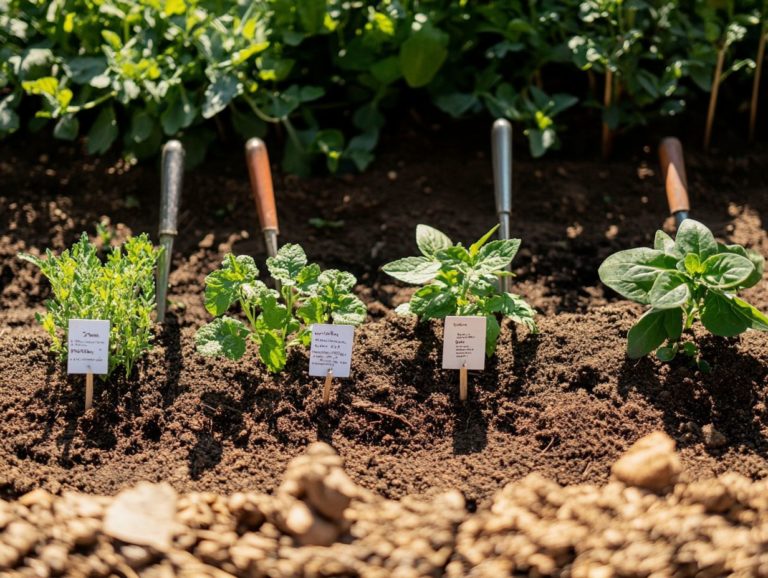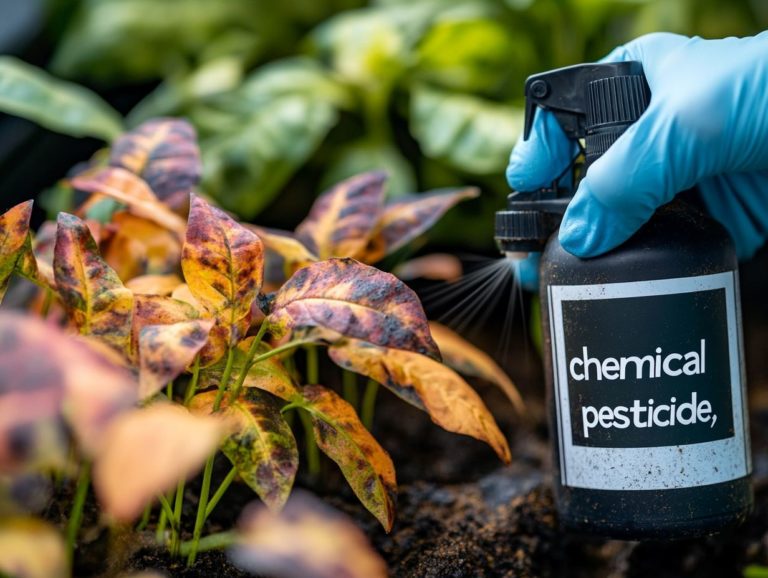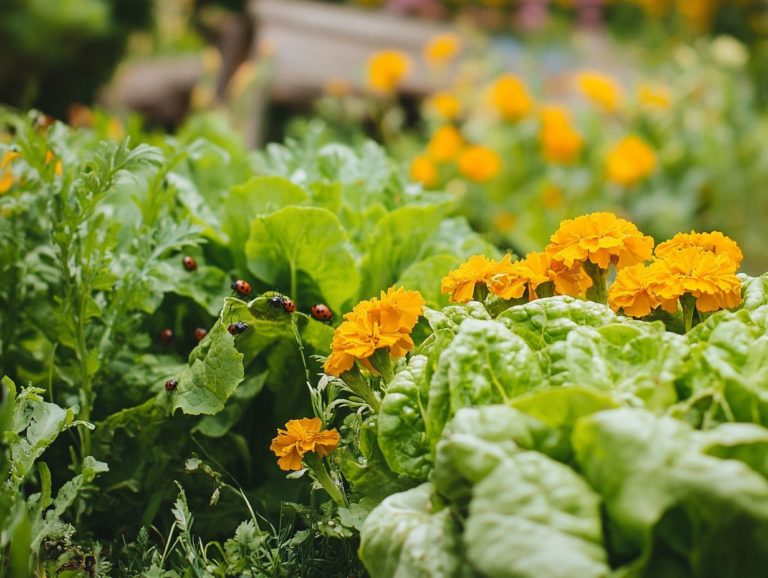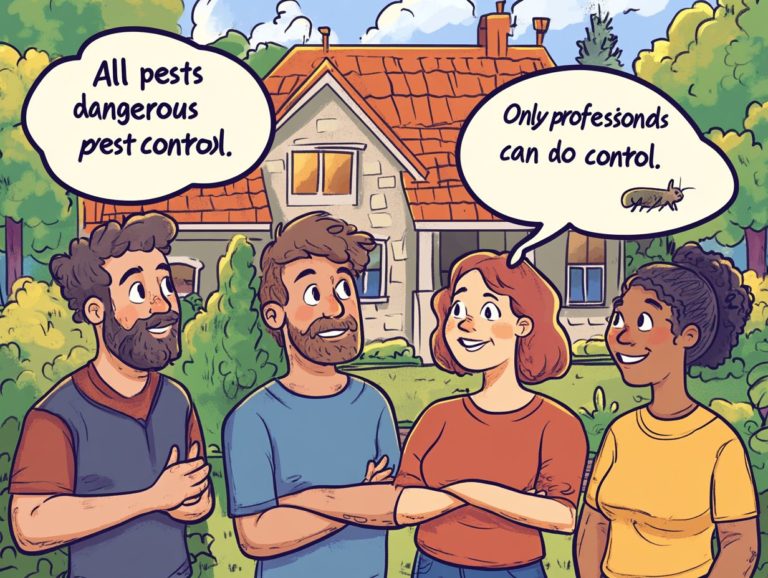Creating a Pest Management Schedule for Your Garden
Pest management is a cornerstone of successful gardening. It influences everything from the vitality of your plants to the overall yield you can expect.
By familiarizing yourself with the various garden pests that could jeopardize your garden, you empower yourself to take proactive measures. This article delves into common pests, outlines a pest management schedule, and explores both natural and chemical control methods.
Get ready to uncover exciting strategies to outsmart those pests and protect your green space. Dive into the exciting world of gardening and cultivate your very own flourishing, pest-free paradise today!
Contents
- Key Takeaways:
- The Importance of Pest Management in Gardening
- Identifying Common Garden Pests
- Creating a Pest Management Schedule
- Natural Pest Control Methods
- Chemical Pest Control Options
- Preventative Measures for Pest Management
- Frequently Asked Questions
- What is a pest management schedule and why is it important for my garden?
- How do I create a pest management schedule for my garden?
- Can I use chemical pesticides in my pest management schedule?
- How often should I monitor my garden for pests?
- Are there any plants I can grow to deter pests from my garden?
- What should I do if I notice a pest infestation in my garden?
Key Takeaways:
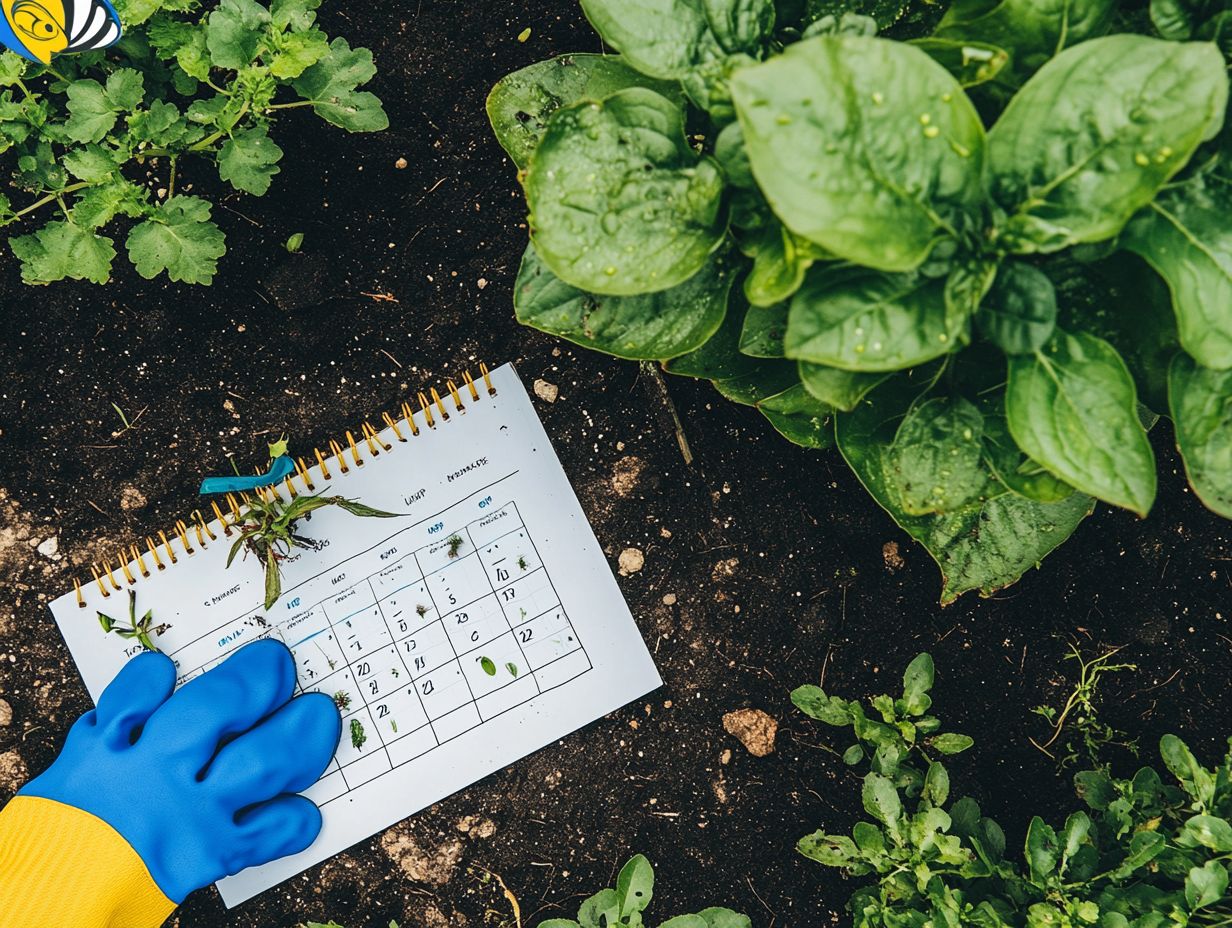
- Pests can significantly impact your garden, making pest management essential.
- Recognizing the types of pests is crucial for an effective pest management schedule.
- Developing a schedule that includes natural and biological control methods keeps your garden healthy.
The Importance of Pest Management in Gardening
Pest management is crucial for successful gardening. It allows your vegetable garden to flourish while minimizing threats from various pests.
By employing effective pest control strategies, such as integrated pest management (IPM), you can improve plant health, increase yields, and lessen your dependence on harmful pesticides.
IPM is a way to manage pests using different methods together, combining cultural practices, biological controls, and diligent monitoring to craft a comprehensive approach that protects both your plants and the environment.
Understanding the role of pests and the significance of pest resistance will help you cultivate an ecosystem that harmonizes with nature s needs.
Understanding the Impact of Pests on Your Garden
Knowing how pests affect your garden is essential for cultivating a healthy and productive vegetable patch. Various garden pests can cause significant damage to your plants if not managed effectively.
These intruders can range from aphids and caterpillars to slugs and snails. Each presents unique challenges, from stunted growth to complete crop failure. Identifying the specific pests plaguing your plants is crucial.
This identification is key to developing effective pest management strategies. Whether it s introducing natural predators or using organic repellents, knowing your enemies makes all the difference.
Regularly monitoring for pests helps in early detection and boosts the effectiveness of your pest control methods. This proactive approach can lead to a flourishing garden ecosystem while minimizing reliance on harmful chemicals.
Identifying Common Garden Pests
Identifying common garden pests is the crucial first step in effective pest management. By recognizing these nuisances, you empower yourself to implement targeted strategies that safeguard your vegetable garden from damage.
Types of Pests to Look Out For
As you examine your vegetable garden, you’ll encounter various pests that can pose significant threats. Insect pests like aphids and slugs can wreak havoc on your crops, leading to considerable damage.
Take aphids, for instance. These tiny, sap-sucking insects reproduce at an alarming rate, resulting in infestations that weaken your plants and foster disease. Slugs, on the other hand, leave slimy trails and have a knack for munching through leaves, leaving unsightly holes in your tender greens.
These pests often complete several life cycles in a single growing season, making effective management essential. To tackle these unwelcome guests, consider employing a mix of biological control methods, such as introducing beneficial insects like ladybugs to handle aphid populations, alongside cultural practices like spacing your plants properly for improved air circulation.
Incorporating companion plants, such as marigolds to repel aphids or garlic to deter slugs, as well as using the three sisters planting method with corn, beans, and squash, can also contribute to a more resilient garden ecosystem, enhancing your efforts to cultivate a thriving vegetable patch.
Creating a Pest Management Schedule
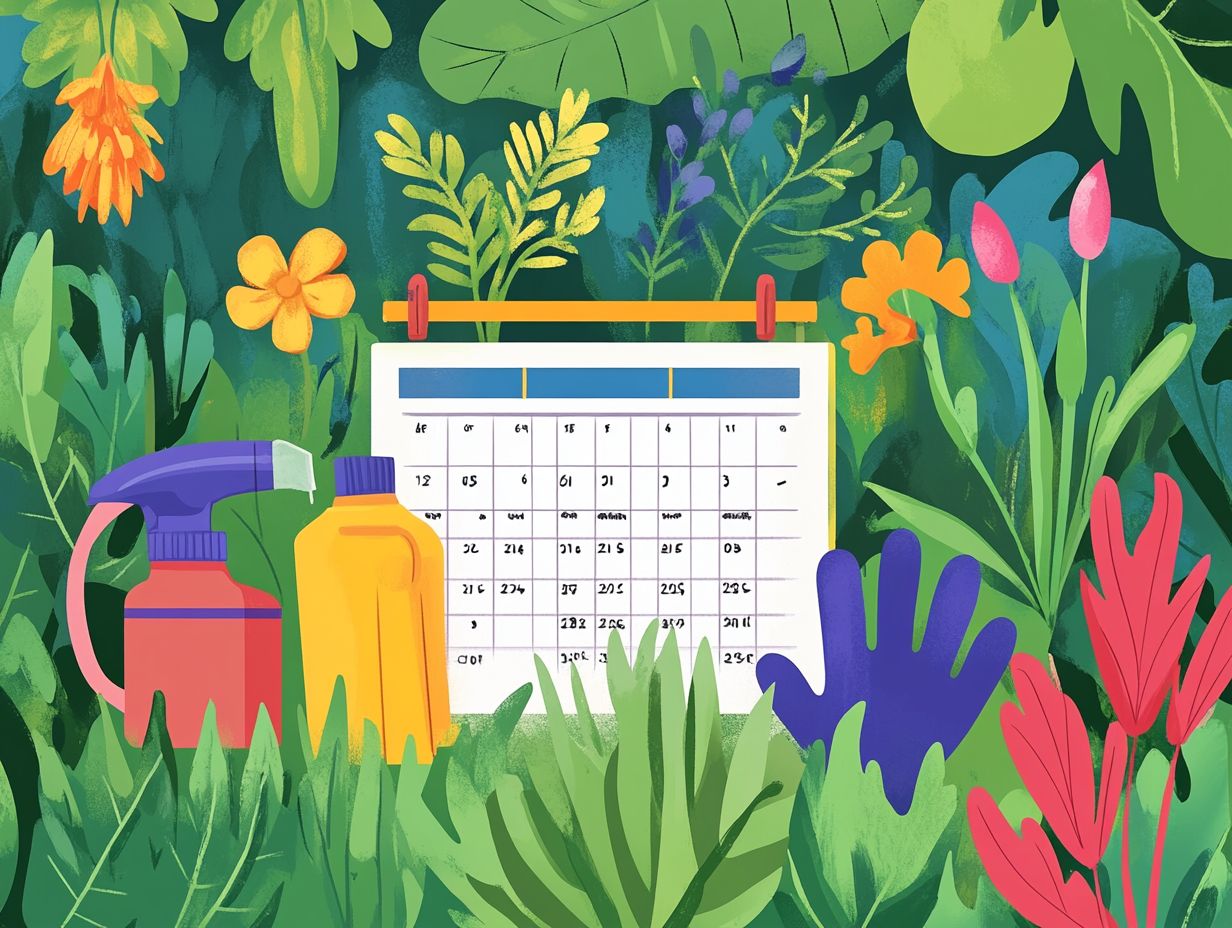
Establishing a pest management schedule is essential for maintaining a flourishing garden and preventing weeds, and learning how to create a pest control diary for your garden can be a valuable step in this process.
This proactive approach helps you tackle pest issues before they become significant challenges. This ensures your garden stays healthy and vibrant.
Steps to Develop an Effective Plan
Creating an effective pest management plan involves several crucial steps. Start with the identification of pests and proceed to implement targeted control tactics, followed by ongoing monitoring.
Understanding the specific pests in your environment is vital. You can achieve this through careful observation and documentation.
Once identified, integrate mechanical control strategies, like traps and barriers. For example, your pest management plan might include companion planting with marigolds to deter nematodes and using insect nets to protect vulnerable crops.
Regularly evaluate the success of these methods. Assess plant health and pest populations to make necessary adjustments, ensuring your plan remains effective over time.
Natural Pest Control Methods
Embracing natural pest control methods is vital for sustainable gardening. These strategies protect not only your vegetable garden but also prioritize beneficial insects and the overall ecosystem.
Choose these approaches to create a thriving garden that harmonizes with nature while effectively managing pests.
Environmentally Friendly Solutions
Implementing environmentally friendly solutions in pest management enhances the health of your vegetable garden while promoting sustainability.
By prioritizing ecological balance, you can fend off harmful pests without using synthetic chemicals. Invite beneficial insects like ladybugs and spiders into your garden; these allies feast on pesky aphids and whiteflies, cultivating a thriving ecosystem.
Integrating practices like companion planting and using natural repellents will elevate your organic gardening efforts. This ensures your garden remains vibrant and healthy while minimizing any negative environmental impact.
Chemical Pest Control Options
When considering chemical pest control options, approach them with caution. Use them only as a last resort.
These methods may have unintended consequences affecting both human health and the environment, especially when using non-targeted pesticides.
When and How to Use Chemicals Safely

When using chemicals in gardening, grasp the right conditions and methods, such as the level at which pests become a problem, to minimize risks while managing pests effectively.
Assess the type of pest you re dealing with alongside the life cycle stage and environmental factors influencing your treatment’s effectiveness.
Using chemical options during calm, dry weather boosts the success of your pest control efforts. Don t miss the chance to integrate these products with cultural practices like crop rotation or companion planting for a holistic approach.
Safe pesticide options, such as neem oil and insecticidal soap, effectively target common garden nuisances like aphids and spider mites. When applied correctly, these options are less harmful to beneficial insects, allowing you to maintain a healthy ecosystem in your garden.
Preventative Measures for Pest Management
Preventative measures are essential in pest management. They can greatly reduce the chances of pest infestations and help your vegetable garden thrive.
Tips for Keeping Pests Away from Your Garden
To keep pests away, use a variety of proactive strategies. These methods will boost your success in organic gardening and pest management.
Start by maintaining healthy soil. Nutrient-rich earth produces strong plants that naturally resist pests. Choosing pest-resistant plant varieties is another smart strategy. For instance, planting marigolds among your vegetables can repel nematodes (small worms that harm plant roots) and aphids (sap-sucking insects).
Another effective method is using physical barriers, like row covers or nets. These protect your crops from harmful insects. Companion planting can also work wonders. Pairing basil with tomatoes enhances flavor and keeps thrips (tiny insects that damage plants) and hornworms (caterpillars that eat tomato leaves) away.
Creating a pest-repellent ecosystem leads to a more abundant harvest with minimal intervention.
Frequently Asked Questions
What is a pest management schedule and why is it important for my garden?
A pest management schedule is a plan for preventing, monitoring, and controlling pests in your garden. To enhance your efforts, consider following guidelines on creating a pest-free zone in your garden. This approach helps maintain a healthy garden by minimizing pest damage.
How do I create a pest management schedule for my garden?
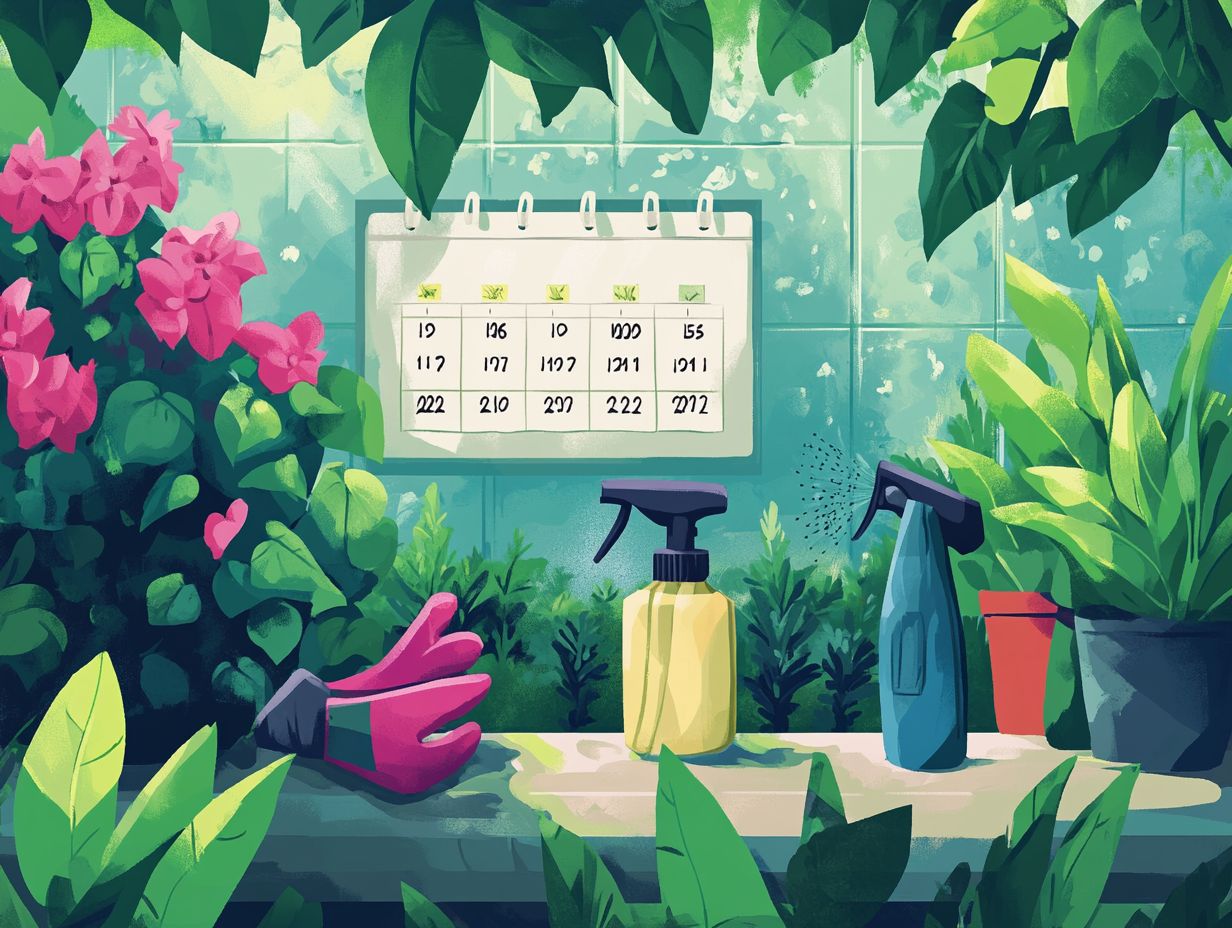
First, identify common pests in your area and the plants they target. Next, research organic and natural control methods.
Create a schedule that includes prevention measures, regular monitoring, and intervention strategies as needed.
Can I use chemical pesticides in my pest management schedule?
Chemical pesticides can be effective but may harm beneficial insects and contaminate your garden. Start with organic methods and consider chemical options only as a last resort.
How often should I monitor my garden for pests?
Regular monitoring is crucial. Check your garden at least once a week to spot infestations early, making control easier.
Are there any plants I can grow to deter pests from my garden?
Yes, plants like marigolds, basil, and chives can naturally repel pests. Plant these alongside your crops as part of your pest management strategy.
What should I do if I notice a pest infestation in my garden?
Act quickly if you see a pest infestation. This may involve handpicking pests, using natural control methods, or inviting beneficial insects.
Consult a local gardening expert for the best approach to your situation.



